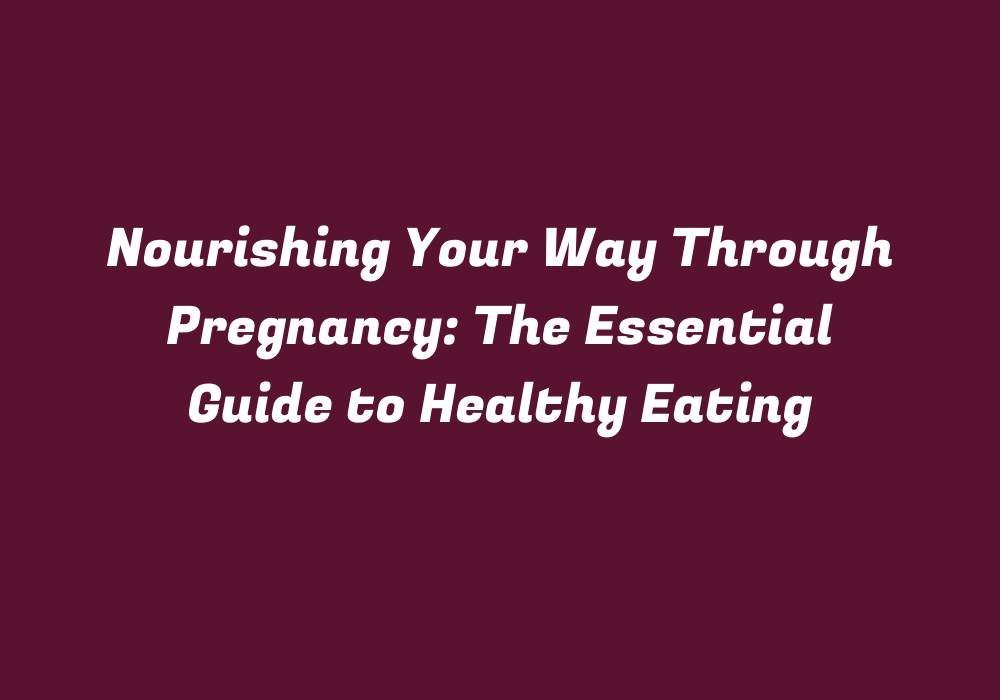Nourishing Your Way Through Pregnancy: The Essential Guide to Healthy Eating
Introduction
Pregnancy is a unique period in every woman’s life where her body undergoes significant changes, and it’s crucial that she adheres to proper nutrition to ensure the health of both herself and her unborn child. Consuming a well-balanced diet during pregnancy involves choosing the right foods for nourishment as well as understanding what nutrients are essential throughout this journey.
Nutrition Needs During Pregnancy
Adequate nutrition plays an important role in supporting the growth and development of the baby, while simultaneously meeting the increased energy demands of the mother’s body. The following essential nutrients should be incorporated into a pregnancy diet:
1. Protein: This macronutrient is vital for the fetus’ growth and muscle tissue formation. Aim to consume 70-100 grams per day, mainly from lean meats, poultry, fish, dairy products, legumes, nuts, seeds, eggs, and tofu.
2. Healthy Fats: Essential fatty acids are crucial for brain development in the baby and can be found in avocados, nuts, seeds, olive oil, and fatty fish like salmon and sardines. Consume 2-3 servings of omega-3 rich foods weekly.
3. Carbohydrates: Complex carbohydrates provide long-lasting energy for the mother and help stabilize blood sugar levels. Opt for whole grains, legumes, starchy vegetables, fruits, and low-fat dairy products.
4. Fiber: Adequate fiber intake promotes regular bowel movements, prevents constipation, and supports digestive health. Include a variety of fruits, vegetables, whole grains, beans, nuts, and seeds in your daily diet.
5. Vitamins and Minerals: Pregnant women require increased amounts of essential vitamins and minerals like folate, iron, calcium, vitamin D, and zinc. Food sources include dark leafy greens, citrus fruits, legumes, whole grains, nuts, seeds, dairy products, and fortified foods.
6. Water: Staying well-hydrated is vital for both mother and baby’s health. Aim to consume at least 8-10 glasses of water per day, with additional fluids coming from fruits, vegetables, and herbal teas.
Creating a Balanced Pregnancy Meal Plan
A well-balanced meal plan during pregnancy should incorporate all the essential nutrients while considering personal preferences and dietary restrictions. Here are some tips to help you create healthy meals:
1. Start with a protein source (e.g., lean meat, poultry, fish, eggs, tofu, legumes) as the foundation of your meal.
2. Include a variety of fruits and vegetables, focusing on colorful options to ensure a range of nutrients.
3. Add complex carbohydrates in moderate amounts (e.g., whole grains, legumes, starchy vegetables).
4. Choose healthy fats like avocados, nuts, seeds, olive oil, and fatty fish for their essential omega-3 fatty acids.
5. Snack on fruits, vegetables, nuts, and seeds for added nutrition between meals.
6. Limit processed foods, sugary drinks, and excessive caffeine consumption during pregnancy.
7. Ensure that your meal plan incorporates a variety of foods from all food groups to maintain a balanced intake of nutrients.
Sample Meal Plan for Pregnancy
Breakfast: Whole-wheat toast with peanut butter, sliced banana, and honey; glass of fortified orange juice; 8 oz glass of water.
Mid-morning snack: Sliced apple with almond butter.
Lunch: Chicken salad sandwich on whole-grain bread, mixed green salad with tomatoes and avocado, and a glass of low-fat milk.
Afternoon snack: Air-popped popcorn and blueberries.
Dinner: Grilled salmon, roasted sweet potato, and sautéed spinach; bowl of whole grain pasta with marinara sauce on the side.
Evening snack: Greek yogurt with mixed berries and granola.
Conclusion
Pregnancy is a time when a woman’s body demands special attention, especially in terms of nutrition to support her own health and that of her baby. By making informed choices and incorporating essential nutrients into your daily meals, you can nourish your way through pregnancy and ensure optimal growth and development for both you and your little one. Remember to always consult with a healthcare professional or registered dietitian if you have any specific concerns regarding your dietary needs during this unique stage of life.
